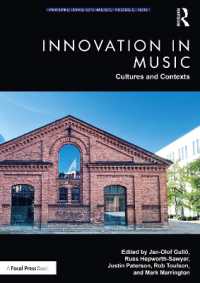- ホーム
- > 洋書
- > 英文書
- > Politics / International Relations
Full Description
The book explores theoretical, methodological, and empirical underpinnings of administrative culture as well as prospects and challenges associated with it in the context of and across developing and transitional countries. Referring to dominant norms and values in public organizations administrative culture is about the attitudes and perceptions of public officials. In many countries civil servants are criticised for being corrupt, incompetent, unreliable and self-centred. Their attitudes, norms and values and the way they act are in constant conflict with rule of law. Recently the virtues of the Weberian model of bureaucracy have been reclaimed as an alternative to New Public Management (NPM): i.e. as a model which emphasizes impartiality, rule-following, expertise, and hierarchy rather than manipulation of incentive structures and market competition. In particular it has been argued that a system of meritocratic recruitment and predictable, long-term careers increases the professional competence of the bureaucrats and fosters a culture of professionalism among them. Still it is unclear how and under what conditions such a model can be adopted. Among main hindrances seems to be established power structures and the existing political and societal culture which undermine the effective implementation of the Weberian model.
This book was published as a special issue of the International Journal of Public Administration.
Contents
1. Introduction to the Special Issue on Administrative Culture in Developing and Transitional Countries 2. Understanding Administrative Culture: Some Theoretical and Methodological Remarks 3. The Role of Organizational Culture on Informal Conflict Management 4. Culture, Administration, and Reform in Africa 5. Bureaucratic Culture and the Social-Political Connection: The Bangladesh Example 6. The Dilemma for the New Administrative Culture in Mexican Public Administration: Esprit de Corps or Individualist Bureaucracy? 7. Performance Appraisal or Praising Performance? The Culture of Rhetoric in Performance Management in Ghana Civil Service 8. Administrative Culture in Bulgaria: Sources, Foundations, and Transitions 9. Implementation of Strategic Organizational Change: The Case of King Abdul Aziz University in Saudi Arabia 10. Public Sector Reforms in Fiji: Examining Policy Implementation Setting and Administrative Culture 11. Administrative Culture and Incidence of Corruption in Bangladesh: A Search for the Potential Linkage








